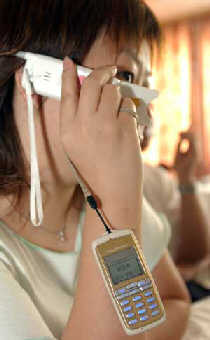Cut-price 'Little Smart' a big hit in China
( 2003-08-17 10:34) (Agencies)
Liu Ying says she was skeptical at first when friends raved about a cheap wireless phone service known in China as "Little Smart."

"In the early days, the signal was so bad that people had to wave their arms or walk around in circles to get it working," she said in the city of Chengde, North China's Hebei Province.
Liu, 25, and unemployed after graduating from university, said she eventually signed up for the service, known as personal access system (PAS) or personal handyphone system (PHS) in the industry, to take advantage of bargain rates and one-way charges.
And over the years, she said, the signal had improved enough to let users talk without annoying disruptions in moving cars.
With at least 20 million subscribers in China, the unusual technology has overcome the initial failure of its launch in its native Japan late in the 1990s, where its level of mobility was over-hyped and the cost advantage was not sufficient to win success.
It is also set to take off in India and Indonesia, the other major developing markets in Asia.
And it offers a growth alternative -- alongside Nextel Communications Inc.'s walkie-talkie push-to-talk system -- to the dominant Global System for Mobile Communications (GSM) and Code Division Multiple Access (CDMA) technologies.
The upstart service, offered by fixed-line firms China Telecom and China Netcom, is cheaper to deploy than true mobile services because it is built on an existing fixed-line network and must remain tethered to its home base.
Analysts say Little Smart will boast as many as 90 million users in China by 2005, despite the likely launch of third-generation mobile services by then.
HOOKING USERS
China had 234.5 million mobile users by the end of June, making it the world's largest mobile market by users, and future subscribers will come from smaller cities or the countryside where some two-thirds of the population live, analysts said.
That's a market that Little Smart, or "Xiaolingtong" in Chinese, can court regardless of 3G because its chief advantage is price, they said. Per minute rates are 50 to 75 percent lower than other mobile services.
Telecoms regulator the Ministry of Information Industry is expected to grant 3G licenses late this year or in 2004, greenlighting a technology that allows users to surf the Internet on phones at high speeds and download video and audio.
"The airplane has not replaced ground transportation even though the former is faster and safer. The same applies to Xiaolingtong," BNP Paribas Peregrine analyst Marvin Lo said in a research note.
He said Little Smart would claim 90 million users by 2005, or about 25 percent of that year's total mobile population. It was allowed to expand into major cities Beijing, Guangzhou and Shanghai just this year.
The MII had previously barred the service from entering large cities for fear of intensifying a profit-denting price war between the country's mobile telephone duopoly China Mobile and China Unicom.
Sure enough, when Little Smart rolled out in key cities earlier this year, mobile operators launched promotions offering rock-bottom prices. But industry watchers said they will have to stop such hefty discounts if they are to stay profitable.
GLOBAL AMBITIONS
What's clear is Little Smart's success has boosted profits at its network equipment makers, like UTStarcom Inc which has about 60 percent of the mainland market, ZTE Corp and Lucent Technologies Inc.
Vendors assemble some of their products from components made by Japanese electronics groups such as Mitsubishi Electric Corp, Kyocera Corp, Hitachi Ltd, Sanyo Electric Co Ltd and Toshiba Corp.
UTStarcom, whose steady rise helped make China chief Wu Ying one of the country's top 50 richest men last year, has ambitious plans to take its version of the service to Vietnam, India, Thailand, Brazil, Mexico and even the United States.
UTStarcom had cut the cost of both equipment and handsets, a spokesman said. "This makes our PAS technology very competitive in other countries," he said.
Vietnam launched the service, known there as "Cityphone," in February in Hanoi, the capital and in the commercial hub of Ho Chi Minh City. State-owned Hanoi Post Co started second-phase network upgrades in July.
With about 10,000 subscribers, Cityphone has got few fans because users say the signal often fails when they get on bicycles.
UTStarcom also said it was helping Thai fixed-line operator TelecomAsia PCL upgrade its existing network, which has about 567,000 users and is available in Bangkok and five surrounding provinces.
The firm has also gained a toehold in India, where about half a dozen limited wireless providers such as Reliance and the Tata Group are fighting for a slice of the low-end market.
Indonesia's PT Telkom is also planning to launch a similar service called TelkomFlexi and is waiting for a regulatory ruling on how mobile the service will become.
|

